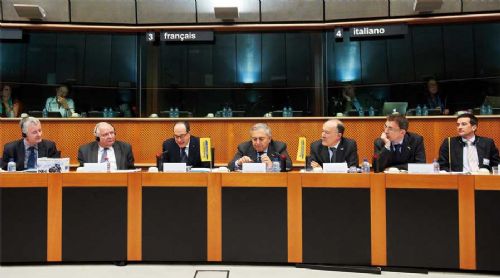
The group, led by Chief executive Franco Fusignani, was invited by Paolo De Castro, Chair of the Committee on Agriculture and Rural Development, to attend the meeting on "Innovation and Technologies for Sustainable Agriculture", organized by De Castro himself, in Brussels. Among the speakers at the event were Joseph Daul, Chairman of the European People’s Party and many other MEP’s including Matthias Groote, Chairman of the "Committee on the Environment, Public Health and Food Safety", Phil Bennion, Elisabeth Jeggle and Mariread McGuinness.
This meeting provided the perfect opportunity to outline for a very select audience of key decision-makers, the brand’s current strategy of developing dedicated machinery and systems to increase sustainable agriculture and cut both polluting emissions and farmers’ dependence on fossil fuels.
In his opening address, Paolo De Castro described the changes made to European legislation as a result of the new and recently approved CAP, underlining how environmental sustainability must go hand in hand with the economic sustainability of each planned measure; in conclusion, he described how energy independence and zero-emissions agriculture have become the only possible way forward.
Franco Fusignani described New Holland’s huge commitment and results achieved in this regard, describing the Clean Energy Leader strategy that has kept the brand constantly at the cutting edge of the sector since 2006, as it strives to develop practical and accessible solutions to reconcile farming needs with the equally important need to protect the environment.
Describing the five pillars of the company’s strategy, which are Biodiesel, Biomass, Tier4A ECOBlue SCR engine technology, reducing carbon footprint, NH2 hydrogen tractors and energy Independent farms, Fusignani explained how New Holland is a major driving force in creating a new type of agriculture that successfully combines farmers’ needs with a greater respect for the environment. He concluded by saying that, "We firmly believe that agriculture has the potential to spur the global economy onwards to a more sustainable future. We also believe that agriculture needs to be the focus of more attention and receive greater financial support in order to fund research projects and promote innovation in agricultural machinery, if the challenges of the future are to be overcome.
Giuseppe Gavioli from CNH Innovation and Advanced Research explained that energy-efficient machinery, biofuels derived from biomass and clean engines are essential to cut emissions and achieve energy independence in agriculture.
Biofuels derived from biomass (biodiesel, bio-ethanol, bio-methane and hydrogen) are the next steps in the roadmap to zero emissions; bio-methane and hydrogen are also better suited to local production in small-scale plants located on farming land.
Pierre Lahutte, New Holland Agriculture Product Management, described in detail each stage of the development of the NH2 hydrogen tractor: the world’s first-ever zero emissions tractor. He also outlined the various tests carried out on the first pilot farm in New Holland’s "Energy Independent Farm" project: La Bellotta di Venaria, where the NH2™ tractor will be introduced this summer. Lahutte also discussed other examples, such as Europe’s first bio-refinery, built by Austrian New Holland dealer, Landtechnik Villach GmbH, which uses forestry and farming biomass to generate bio-methane and hydrogen in particular.
The event was also addressed by Benoit Lavier, farmer and founding member of IAD (Institut de l’Agriculture Durable) which New Holland Agriculture is a partner of. He discussed how Conservative Agriculture is becoming increasingly popular in Europe, and how important it is to set in motion a virtuous cycle embracing all manufacturers of agricultural foods, energy and machinery, and boosting biomass production at the same time.
The closing address was given by Joseph Daul, who praised New Holland for the company’s commitment in developing agriculture, technology and innovation in Europe, underlining how the optimized use of resources is a crucial factor. To this end, greater integration and more synergy between environment, agriculture and development is needed, which could be further helped by more focused action and investment in research.
